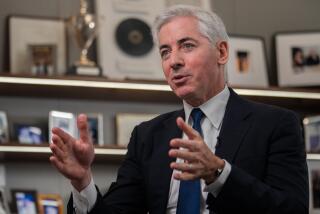The moment Bill Gross’ days at Pimco became numbered: A broker’s view
Ever since the bombshell announcement of Bond King Bill Gross’ decampment from Pimco to the much smaller Janus Capital, Wall Street pundits and players have been offering their takes on what happened. (Ours is here.)
But the best and most telling analysis we’ve seen comes from the estimable Josh Brown, proprietor of the Reformed Broker website and author most recently of the book “Clash of the Financial Pundits: How the Media Influences Your Financial Decisions for Better or Worse.” As you might expect, Brown gives an investment manager’s view of the turmoil at Newport Beach-based Pimco.
The theme of Brown’s post, “Do We Need to Fire Pimco,” is that money managers have had reason to bail out on Gross’ Total Return Fund for years; many have just been waiting for the right moment to pull the trigger. He dates the start of the disaffection period to one of Gross’ most notable, and wrong, calls--his announcement in February 2011 that he was taking Total Return’s allocation to U.S. Treasuries down to zero, from as much as 22% late the previous year.
The announcement shocked the markets -- Gross was “abandoning” treasuries, it was said. As Brown recounts the moment:
“Gross compounded the move by being extremely vocal about his rationale – he went so far as to call Treasury bonds a ‘robbery’ of investors given their ultra-low interest rates and the potential for inflation. He talked about the need for investors to ‘exorcise’ U.S. bonds from their portfolios, as though the asset class itself was demonic. He called investors in Treasury bonds ‘frogs being cooked alive in a pot.’ The rhetoric was every bit as bold as the fund’s positioning.”
It was also, as Brown relates, dead wrong. The treasury’s 10-year generic bond yield fell from 3.58% at the time of Gross’ call to 1.53 in July 2012. It’s now 2.54%. Since bond prices move in the opposite direction from rates, Gross placed himself on the sidelines of a huge bull run. Within months he was admitting he had made a mistake, a big shock from someone with the closest thing to an infallible record up to then.
The Total Return Fund has consistently underperformed its benchmark, the Barclays U.S. Aggregate Bond index, ever since. (See accompanying chart, courtesy of Brown.) Investment managers’ fingers grew itchy on the triggers; the old investment saw that you could never be fired for putting your client’s money with Bill Gross began to seem more and more quaint. That was especially so as Gross’ own demeanor got more weird. There was his falling out with co-Pimco CEO Mohamed El-Erian that led to El-Erian’s resignation, and his opera buffa performance at a major investment conference in June.
Roughly $70 billion in assets fled the Total Return fund since March 2013. Gross resignation may generate a further flight, even though Pimco moved promptly to name a three-person management team as his successors at the fund.
Brown thinks it’s doubtful that a great portion of this outflow will end up with Gross at Janus. He suggests that Gross’ recent history will deliver the lesson that putting your eggs in a single investment guru’s basket is a bad idea, even if the guru has compiled a Gross-type record; there’s always a seam that can blow. Much of the money may land at Vanguard, Brown suggests, where passive management is the cult -- that is, funds are designed to track the indexes as closely as possible, not to try to beat them. As we reported earlier, even the huge pension fund CalPERS has finally begun to drink from the passive-investment well, and the mercurial behavior of active managers like Bill Gross underscores the wisdom of their choice.
Keep up to date with The Economy Hub by following @hiltzikm.







